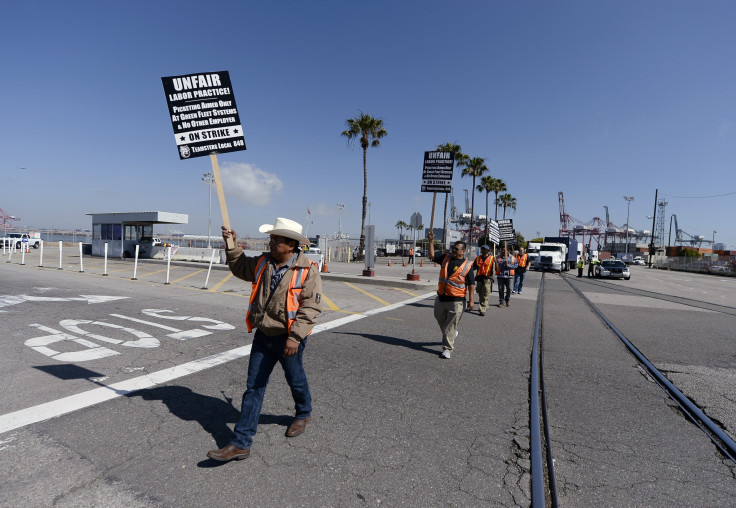Longshoremen Ordered Back To Work After Joining Trucker Strike Backed By Teamsters

Amid delicate negotiations that will determine the flow of a third of all U.S. cargo container traffic for the coming months, dozens of longshore workers at two of the country’s busiest ports were ordered back to work Tuesday after they walked off the job in solidarity with a group of fed-up truck drivers.
The longshore workers returned to their jobs at about 11 a.m. at the Port of Los Angeles and the adjoining Port of Long Beach after a federal arbitrator said their walk-off was against their contract.
The workers began a strike on Monday to express solidarity with about 120 truck drivers backed by Teamsters Local 848 who claim they are improperly classified by their employers as contract workers. Unlike direct employees, contract workers are typically paid less, bear higher payroll deductions and receive fewer if any benefits than regular employees.
The drivers work for three nearby companies, Green Fleet Systems, Total Transportation Services Inc. and Pacific 9 Transportation, which handle cargo to and from the ports. It’s the fourth such protest in the past year, including a two-day strike in April. Drivers were seen picketing the truck yards and following drivers from these companies to and from the ports.
"Green Fleet is discouraged to learn that outside interest groups have again decided to block the rights of these drivers to go to work and earn a living,” the company said in an email sent to IBTimes on Tuesday. “The fact is that an overwhelming majority of contractors and drivers affiliated with Green Fleet don't want these groups involved in their work.”
The International Longshore and Warehouse Union (ILWU), which represents the workers keeping cargo flowing through 30 West Coast ports, is currently in talks to renew a six-year contract with the Pacific Maritime Association (PMA), which represents the port operators.
On Monday, the two sides announced a cooling-off period in the heated negotiations that will establish new pay and benefits for the roughly 20,000 workers that move cargo between the ships, terminals and trucks. Historically, these talks often run past the June 30 contract-expiration date but are typically resolved by the middle of July.
“During this break, starting at 8 a.m. on Tuesday, July 8, through 8 a.m. on Friday, July 11, the parties have agreed to extend the previous six-year contract, which expired last week,” said a joint statement from the ILWU and PMA.
The longer these negotiations take, the more likely workers will institute slowdowns, which can force cargo movement to a crawl. In 2000, talks went on for months in part over issues pertaining to port automation, which reduces the need for workers. Port operators instituted a 10-day lockout that required then-President George W. Bush to invoke his authority to order the reopening of the ports.
The smooth operation of U.S. ports is vital to the country’s commercial activity. In May, retailers warned businesses to expect operations to slow this summer.
© Copyright IBTimes 2024. All rights reserved.






















